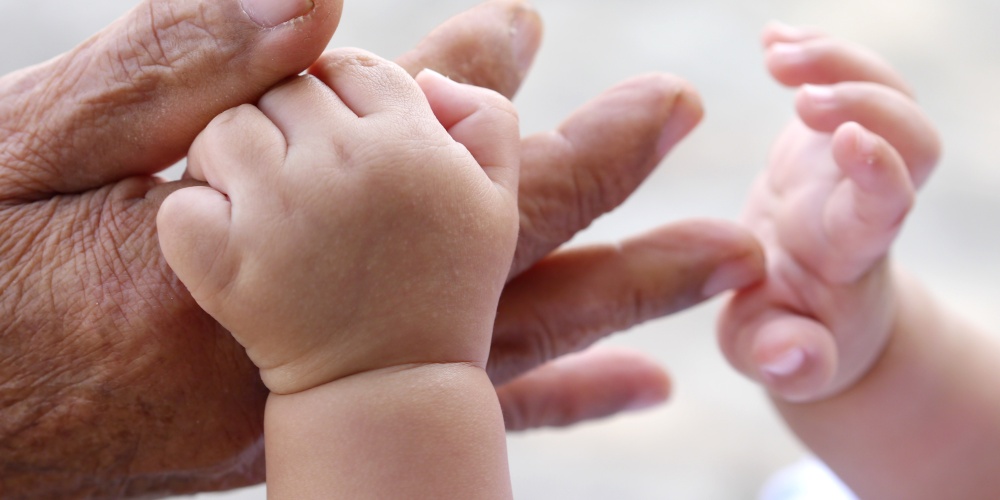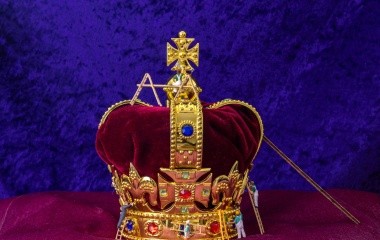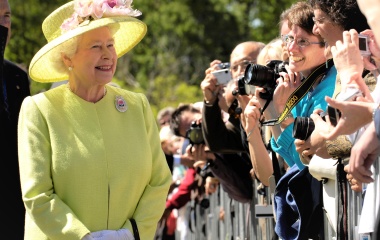
The thoughts below are dedicated in celebration of the birth of our granddaughter, Tikva Razel. May our children Atara & Noah raise Tikva Razel to a life of Torah, chuppah and maaseem tovim, and may she 'be like our foremothers Sarah, Rivka, Rachel and Leah'. May we merit to celebrate many smachot. Ilana and Jay
One of the most beautiful customs in our tradition is the blessing of one’s children on Friday night. As one readies to recite kiddush, acknowledging and blessing the Creator of the Universe, we bless our children, the greatest and most miraculous of all creations.
On Shabbat the hustle and bustle of time stands still, as we move from this world, to get a taste of the world to come. As one blesses one’s children, week after week, one is cognizant of the passage of time. While Shabbat links us to the past, to Creation and the Exodus, our children link us to the future. It is the link on the chain of tradition that sanctifies time and it is on Shabbat we are most cognizant of that link[1].
We bless our daughters that they should be like our matriarchs, Sarah, Rivka, Rachel and Leah. Yet we do not bless our sons that they should be like Avraham, Yitzchak and Yaakov. Rather, we invoke the words that Yaakov spoke to Yosef that the “Lord shall make you like Ephraim and Menashe” (Breisheet 48:20). What is so special about Ephraim and Menashe – more so than Avraham, Yitzchak and Yaakov – that it is they who serve as the model we wish our children to emulate? This question is compounded by the fact that the Torah tells us absolutely nothing about them. Nary a word of theirs is recorded in the Bible, not even when Yaakov blesses them.
While there are numerous answers to this question[2] I would like to focus on a simple but profound idea of Rav Soloveitchik. Ephraim and Menashe were the first people recorded in the Torah to have a relationship with their grandfather. Though Yaakov and Eisav were 15 when Avraham died, and Yosef was 29 when Yitzchak died – likely making Reuven near 40 – there is no mention of any relationship between grandparent and grandchild. Only regarding Yaakov and his grandchildren, Ephraim and Menashe, is that first bond mentioned. And this linkage of the generations continues with Yosef and the children of Ephraim and Menashe. “Yosef lived to see children of the third generation of Ephraim; the children of Machir, son of Manasseh were likewise born upon Yosef’s knees” (Breisheet 50:23).
It is this relationship between grandparent and grandchild that is the reason, Rav Soloveitchik explains, that it is Yaakov Avinu who is the founder of Bnei Yisrael, the Jewish people. Avraham and Yitzchak were the leaders of families; however, it was Yaakov who laid the foundation of the Jewish people.
“The three-stranded cord” — grandparent-child-grandchild — “will not quickly be broken”. (Kohelet 4:12).
What is the role of grandparents? The Torah is clear that we must respect and be in awe of our parents, the mitzvot of kibud and morah, but says very little about one’s obligations to one’s grandparents. What the Torah does speak about is the relationship of grandparents to their grandchildren. “Now Israel’s[3] eyes were dim with age; he could not see, so [Yosef] brought them close to him, and he kissed them and embraced them” (Breisheet 48:10).
The role of the grandparents is to shower their grandchildren with love, with hugs and kisses and all kinds of gifts. Parents, whose love of their children may be boundless, are tasked with the roles of teacher and disciplinarian, not roles associated with love. Of course, with few diapers to change and an opportunity to sleep through the night, grandparents have the ability to enjoy the sweetness of their grandchildren without experiencing tzar gidul banim, the difficulty of childrearing. They reflect the midat harachamim, the attribute of mercy, whereas parents have to temper rachamim with din, justice. While parents may make rules, grandparents tend to break them.
There is an additional, crucial role that grandparents play in the raising of grandchildren. “Take utmost care and watch yourselves scrupulously, so that you do not forget the things that you saw with your own eyes [at Mount Sinai] and so that they do not fade from your mind as long as you live. And make them known to your children and to your children’s children” (Devarim 4:9). It is the role of grandparents to link us to our past – in a way that one’s parents cannot do. They bring the past to life with excitement and joy as they connect us to worlds long gone[4].
While our parents are responsible for teaching us the knowledge of Torah it is the grandparents who share the experience of Torah, ensuring its continuity and eternity. “The words that I have placed in your mouth, shall not be absent from your mouth, nor from the mouth of your children, nor from the mouth of your children’s children—said G-d—from now on, for all time” (Yishayahu 59:21).
I was fortunate to grow up with three grandparents (and am named for the fourth). Tragically, many of my friends, children of survivors, had no grandparents. The “lucky” ones had one or two.
Ilana and I have been blessed with our first grandchild, Tikva Razel, a name that links the past to the future. Razel was Ilana’s grandmother who passed away last year at the age of 96. Tikva reflects our hopes for the future – one reflecting the special time we are living in and the fact that she was named in the month of Av, the month that we hope will soon be a month of joy.
Av of course also means a father, and it is to our Father in Heaven to whom we give thanks. We pray that Atara and Noah together with Tikva Razel’s grandparents will raise her l'Torah chuppah and maaseem tovim. May G-d bless all of us to share in many smachot.
[1] Hence the four tefillot of Shabbat focus on Creation, Revelation, The Temple and future redemption.
[2] They were the first brothers not to fight, they grew up in the fleshpots of Egypt and yet remained faithful to their ancestral faith, they – at least in Midrashic literature – combined worldly success with Torah learning.
[3] It is surely not coincidental that from the moment Yaakov meets his grandchildren the Torah which had been using the name Yaakov, switches to the name Yisrael. Immediately after Yisrael blesses his grandchildren and this episode ends his name reverts back to Yaakov.
[4] In much more eloquent language Rav Soloveitchik sees this as the greatness of his mother. “Most of all I learned that Judaism expresses itself not only in formal compliance with the law but also in a living experience. She taught me that there is a flavor, a scent and warmth to mitzvot. I learned from her the most important thing in life – to feel the presence of the Almighty and the gentle pressure of His hand resting upon my frail shoulders. Without her teachings, which quite often were transmitted to me in silence, I would have grown up a soulless being, dry and insensitive”. (From A Tribute to the Rebbtizin of Talne which you can read here I highly recommend you do.)



